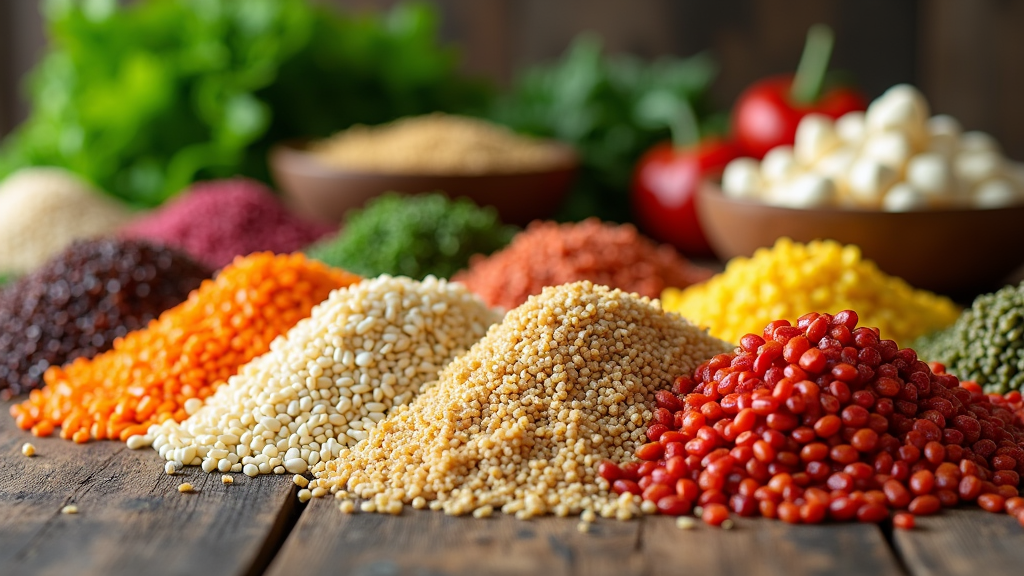
If you’ve been curious about switching to a plant-based diet but worry about getting enough protein, you’re not alone. Many people hesitate because of myths and confusion about protein sources in a vegan or plant-based lifestyle. I used to be skeptical too until I learned about sustainable ways to enjoy a protein-packed diet without relying on meat.
Why Many People Struggle with Plant-Based Dieting (And How You Can Avoid Common Pitfalls)
Switching to a plant-based lifestyle often comes with challenges. Common issues include the fear of missing out on protein, confusion about which foods to trust, and the overwhelming amount of contradictory nutrition advice available online. Many struggle due to:
- Misunderstanding the variety of plant-based protein sources available.
- Overcomplicating meal planning, leading to nutritional gaps.
- Believing that plant proteins are inferior to animal proteins.
- Difficulty in accessing reliable, practical guidance on sustainable dieting.
Understanding these common challenges can help you avoid unnecessary stress. It paves the way for a balanced, protein-rich plant-based diet that works with your lifestyle without overcomplicating your choices.
What is Sustainable Plant-Based Dieting Without Sacrificing Protein?
Sustainable plant-based dieting means making intentional food choices that support your health, the environment, and animal welfare, all while ensuring your body gets enough protein. This type of diet focuses on real, whole-food sources like legumes, nuts, seeds, and whole grains, which provide ample protein without the need for meat.
Here’s what you can expect from a sustainable, plant-based approach that keeps your protein levels in check:
- All-in-One Meal Planning: Emphasis on variety, balancing meals with beans, lentils, tofu, tempeh, quinoa, and more to cover all your nutritional bases.
- Emphasis on Nutrient-Dense Foods: Choosing whole foods over processed alternatives to maximize nutrient intake and avoid empty calories.
- High-Protein Plant Options: Incorporation of foods like seitan, edamame, and chia seeds to ensure every meal is satisfying and protein-rich.
- Flexibility and Sustainability: Developing a routine that is both environmentally friendly and easy to maintain over the long term.
- Balanced Macronutrients: A focus on mixing proteins with healthy fats and complex carbohydrates to support overall energy and well-being.
This approach is well-suited for anyone looking to transition gradually to a plant-based lifestyle without compromising on protein intake.
How I Achieved a Balanced, Plant-Based Life
My adventure into sustainable plant-based dieting started with a lot of research and humble experimentation in the kitchen. I was initially worried about losing muscle mass and energy, but quickly figured out that plant proteins can be just as effective if you plan your meals right. I began with simple dishes, gradually learning which combinations gave me the strength and vitality I was looking for.
- At first, I replaced one meal a day with a protein-packed plant-based option, incorporating lentils, chickpeas, and quinoa.
- Soon, I experimented with various recipes and found that dishes like tofu stir-fry and bean chili were both satisfying and delicious.
- In a few months, I experienced a noticeable improvement in my energy levels and recovery after exercise, which reassured me that I was on the right path.
- Within a year, I had established a full plant-based dietary routine that is now a key foundation of my healthy lifestyle.
This personal experience taught me that with the right information and a bit of creativity, transitioning to a protein-rich plant-based diet is entirely achievable.
Why a Protein-Rich, Plant-Based Diet Can Work for You
Many people worry that switching completely to plant-based foods means sacrificing protein quality. However, understanding the range of plant-based protein options available can dispel these concerns. Here are a few aspects that make this diet both sustainable and effective:
Beginner-Friendly Meal Planning
Even if you’re new to plant-based nutrition, you don’t have to overhaul your entire diet overnight. With a bit of planning and some reliable resources, you can create meals that are both hearty and balanced. Meal planning involves learning the right food combinations and being aware of serving sizes to ensure you meet your daily protein goal.
Convenient and Accessible Food Options
The market now offers a wide range of plant-based products that simplify meal preparation. From pre-cooked legumes to innovative meat substitutes, these options make it easier to stick to a diet that supports your goals without requiring hours in the kitchen.
Community and Resources to Guide You
Another benefit is the growing community of plant-based enthusiasts who share recipes, advice, and personal tips. Whether you’re checking in on online forums, local cooking classes, or social media groups, tapping into these networks can provide encouragement and invaluable insights on maintaining a protein-rich plant-based lifestyle.
Success Stories from Real Plant-Based Enthusiasts
In many ways, the best testimony is the success of others who made this transition. I’ve come across numerous stories from people who once doubted the feasibility of a sustainable, protein-packed diet:
“I used to believe that a plant-based diet meant I was missing out on important nutrients. Now, after switching my meals, I feel energetic and have even gained lean muscle mass. It truly feels like a win-win.” – A dedicated plant-based dieter.
“The variety of recipes online made it easy to find delicious meals that kept me satisfied without meat. I never expected to enjoy cooking so much until I saw results in my health and vitality.” – A converted health enthusiast.
These real-life experiences show that with the proper planning and community support, sustainable plant-based dieting can be both fulfilling and nutritionally adequate.
Try a Sustainable Plant-Based Diet for a Week. No Commitments Required.
If you’re still on the fence about transitioning, try it out for a week. Challenge yourself to explore a diverse range of plant-based protein sources and recipes. During this trial, focus on incorporating at least one high-protein food item into each meal. Not only will you likely notice an improvement in your energy, but you may also stumble upon new flavors you never considered before.
This short-term trial can help you determine whether this lifestyle fits your needs without any long-term commitments. All you need are basic ingredients, a willingness to experiment, and a reliable recipe or two to get started.
Join Our Community and Access Exclusive Recipes
Access to the right tools can make a world of difference when transitioning to a plant-based lifestyle. By joining a community of like-minded individuals, you can tap into a wealth of shared knowledge. Many platforms and online groups offer:
- Exclusive recipes that focus on integrating high-protein foods into everyday meals.
- Diet planning tips and advice from nutrition experts who have been there.
- A supportive network to answer questions, share experiences, and troubleshoot issues.
This community-driven support system makes the journey smoother and more enjoyable. It ensures you’re never alone as you make smarter dietary choices and gradually build a sustainable routine.
Are You Ready to Embrace a Sustainable Protein-Packed Lifestyle?
- No extensive cooking experience or gourmet skills required.
- No need for expensive supplements when whole foods provide everything you need.
- A genuine opportunity to improve your overall well-being while supporting a healthier planet.
If you’re ready to move away from meat-centric meals and explore the vibrant world of plant-based proteins, now is the time to start. Embracing a sustainable, plant-based diet lets you enjoy the benefits of improved health, increased energy, and a positive environmental impact. Make small, deliberate changes today and experience the delicious versatility of a plant-based lifestyle.
Your adventure towards healthier eating and a balanced protein intake begins with just one step. Remember, every meal is an opportunity to nourish your body and contribute to a more sustainable world.
Additional Tips for Long-Term Success
To truly make the most of a plant-based lifestyle, consider adding a few more strategies to your daily routine. First, plan your meals in advance and prepare larger portions that can be enjoyed over a couple of days. This not only saves time but also helps you keep an eye on your nutritional intake. Mixing in seasonal vegetables, different grains, and various legumes can keep your meals exciting and reduce the temptation to revert to old habits.
It is also very important to experiment with spices and herbs. Fresh flavor combinations can completely transform a simple dish into something next-level cool. By rotating your recipes and trying out new cuisines, you keep your diet vibrant and nutritionally diverse. Furthermore, remember that small setbacks are normal. Keep a journal of your meals and energy levels; this will help you notice patterns and adjust your diet as needed.
Maintaining regular check-ins with supportive community members or a nutrition expert can also provide that extra boost you need when challenges arise. With persistence and an open mind, the glowing health benefits of a plant-based diet will continue to unfold.
